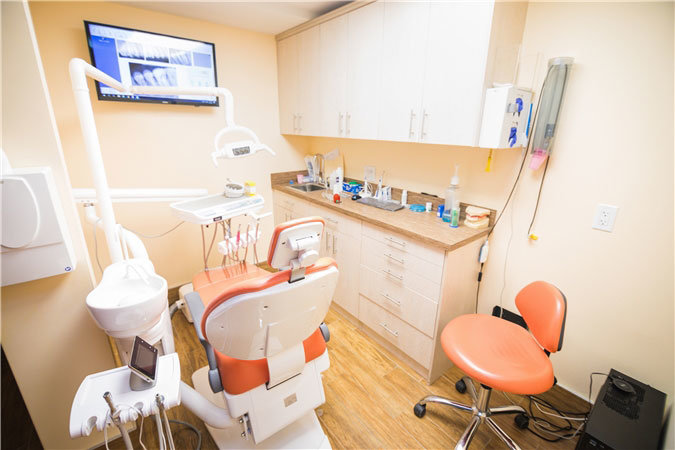Our Services
Dentistry dedicated to excellence.
Dental Services
Best Dental Services In Brooklyn, 11229
At our amazing dental office – Eco Dental NY, located in 2384 Ocean Avenue. We give caring, high quality dental services for our customers. We do a full exam and cleaning, dental implants, veneers, teeth whitening, a full mouth restoration. We do our best to give you the beautiful smile you always dreamed of.
Our dental office uses the best, most high quality, and latest technology to make your beautiful, natural smile even better. Our dentists have many treatments to help you achieve the most gorgeous smile ever. Your smile is our top priority.
Pricing Plans
Dental Implants
$899
starting at
- Consultation
- Panoramic X-ray
- Placing implant
Cosmetic Crown
$699
starting at
- Consultation
- X-ray
- Crown
Teeth Whitening
$350
Per session
- Consultation
- Cleaning
- Whitening
Visit With Our Friendly Dentists
Our Office Is Open To New Patients
Our workers are eager for you to visit us for the first time. We do our best when making your appointments comfortable for you. Our staff carefully listen to your comments, questions, worries and do their best with helping you.
Trust us with your smile
Your first visit
We begin your visit with the dentist listening to your worries, needs, and goal. Usually your first visit takes around 45-60 minutes when doing panoramic x-rays, examinations, we take pictures of your face and teeth, and cancer screening.
Finance available
How We Work With Your Payments
Dental treatment can be pricey and that everyone’s financial situation is different. We offer different options such as the ones below:
- Insurance
- Third party financing options through Care Credit
- Checks, cash and all credit cards


Have a question that is not answered below? Feel free to give us a call and ask!
General Dentistry FAQs
Many people do not see a dentist on a regular basis. They only go when they have a problem. This is known as “crisis treatment” versus “preventive treatment.” While these patients may feel they are saving money, it often ends up costing much more in dollars and time. This is because many dental problems do not have symptoms until they reach the advanced stages of the disease process. An example is tooth decay. It is typical to hear, “Nothing hurts… I don’t have any problems.”
Tooth decay often does not hurt until it gets close to the nerve of the tooth. It is not uncommon to see a patient with a huge cavity who has never felt a thing. The dentist can usually detect a cavity 3-4 years before it develops any symptoms. This early detection can help you prevent root canal treatment.
Flossing reduces the number of bacteria in your mouth. There are millions of these microscopic creatures feeding on food particles left on your teeth. These bacteria live in plaque which can be removed by flossing. Brushing your teeth gets rid of some of the bacteria in your mouth. Flossing gets rid of the bacteria the toothbrush can’t get to. That’s the bacteria hiding in the tiny spaces between your teeth. If you do not floss, you allow plaque to remain between your teeth. Eventually it hardens into tartar. Plaque can be removed by brushing. Only the dentist can remove tartar.
Ask your dentist to show you the proper way to floss. You will both notice the difference at the next cleaning appointment.
Make it fun! If you are enthusiastic about brushing your teeth, your children will also be enthusiastic. Children want to do the things their parents do. If your children see you brushing your teeth and displaying good dental habits, they will follow. Ask the dentist for other creative ways to get children to brush their teeth.
Getting your children to brush starts with taking them to the dentist at an early age. All children should be seen by their first birthday or 6 months after the eruption of the first tooth.
Always spend two to three minutes brushing your teeth. It takes that long to get rid of the bacteria that destroy tooth enamel. Do not brush too hard. It takes very little pressure to remove bacteria and plaque. Floss at least once a day. Flossing is the only way to get bacteria from between your teeth.
Watch the sugar you eat. There is sugar in candy, fruits, crackers and chips. These are the foods that the bacteria in your mouth like best. Be mindful of foods like raisins and peanut butter that stick to your teeth. They can provide a constant supply for the bacteria eating into your teeth. Try to minimize the times during the day when sweet items are eaten and brush your teeth afterwards.
If you cannot brush after a meal, rinse your mouth with water – which can help to remove food from your teeth. Chewing sugarless gum after a meal can also help. Chewing deskulates the flow of your saliva which acts as a natural plaque-fighting substance. And do not forget your regular dental visits. Good dental habits will go a long way toward a no-cavity visit.
Many diseases of the teeth and surrounding tissues cannot be seen when the dentist examines the mouth. An X-ray examination may reveal:
- small areas of decay between the teeth or below existing restorations (fillings)
- infections in the bone
- periodontal (gum) disease
- abscesses or cysts
- developmental abnormalities
- some types of tumors
Finding and treating dental problems at an early stage can save time, money and often unnecessary discomfort. X-rays can detect damage to oral structures not visible during a regular exam. If you have a hidden tumor, X-rays may even help save your life. Dentist will evaluate your need for X-rays based on the conditions present in development. There are many benefits to having X-rays taken. Any additional questions or concerns should be discussed with your dentist.
Like other investments, if you whiten your teeth, the length of time you can expect it to last will vary. If you smoke, drink red wine or coffee, or consume other acid-containing foods, your bright smile may begin to yellow more quickly than you expect. In general, a teeth whitening procedure can last up to a few years. And even though the results can fade, occasional touch-ups can be done to regain luster.
Like other investments, if you whiten your teeth, the length of time you can expect it to last will vary. If you smoke, drink red wine or coffee, or consume other acid-containing foods, your bright smile may begin to yellow more quickly than you expect. In general, a teeth whitening procedure can last up to a few years. And even though the results can fade, occasional touch-ups can be done to regain luster.
The exact cause of canker sores is unknown. Some factors may include genetics, allergies, stress, and vitamin and mineral deficiencies. Trauma to the inside of the mouth can result in the development of canker sores. Ill-fitting dentures or braces, toothbrush trauma from brushing too hard, or biting your cheek, may produce canker sores. Certain foods may also be a factor. Citrus or acidic fruits and vegetables can trigger a canker sore or make the problem worse. Foods like chips, pretzels and hard candies have sharp edges that can nick and injure the soft tissue of the mouth.
To treat a canker sore, rinse your mouth with antimicrobial mouthwash or warm water and salt. Over the counter treatments are also available. If the canker sore is present longer than two weeks, see your Eco Dental NY.
Smokeless tobacco may be smokeless, but it isn’t harmless. These are some of the potential hazards:
- A sore that does not heal
- A lump or white patch
- A prolonged sore throat
- Difficulty in chewing
- Restricted movement of the tongue or jaw
- A feeling of something in the throat
- Pain is rarely an early symptom. All tobacco users need to see their dentist regularly.
People often respond to bleeding gums with the wrong method of treatment. Usually, gums that bleed are a symptom of the onset of periodontal disease or gingivitis. But often, people stop brushing as frequently and effectively because it may be painful or it may cause the gums to bleed again. However, when gums are inflamed, brushing could help reduce the inflammation. More importantly, you should see your dentist to have a periodontal screening and recording performed in order to determine the level of disease present and the best treatment course to pursue.
It is also worth noting that chronic dental pain and discomfort are obvious signs of a problem. Over-the-counter drugs may provide some temporary relief. These medications usually only mask the existence of a problem and should be taken on a temporary basis.
It is important to see your dentist as soon as possible if your gums begin to bleed.
Many factors work to destroy the naturally white smile you were born with. Tobacco, certain foods, and certain drinks actually stain teeth. These substances continually work on our teeth causing our white smile to gradually fade. Hot coffee and tea are especially hazardous to your smile because they change the temperature of teeth. This temperature change – hot and cold cycling – causes the teeth to expand and contract allowing stains to penetrate the teeth. Cutting down on coffee and tea can go a long way to creating a great smile. Foods that are slightly acidic are also dangerous to your white smile. These foods open up the pores of the tooth enamel allowing stains to move more easily into the tooth.
Your dentist can help you with more tips on keeping a white smile.
Research today suggests a link between gum disease and diabetes. Research has established that people with diabetes are more prone to gum disease. If blood glucose levels are poorly controlled you may be more likely to develop gum disease and could potentially lose teeth. Like all infections, gum disease can be a factor in causing blood sugar levels to rise and make diabetes harder to control. Be sure to see your dentist regularly for check-ups and follow home care recommendations. If you notice other conditions such as dry mouth or bleeding gums, be sure to talk with your dentist. And don’t forget to mention any changes in medications.
The American Dental Association cites sealants as an effective weapon in the arsenal against tooth decay. Sealants are a thin coating painted on chewing surfaces of molars and premolars. Dental sealants act as a barrier, protecting your teeth against decay-causing bacteria.
Sealants have proven effective with both adults and children, but are most commonly used with children. Despite the fact that sealants are about half the cost of fillings, only a small percentage of school-aged children have sealants on their permanent teeth. Ask your dentist whether sealants are a good choice for you or your children.
The American Dental Association recognizes that piercing is a widely accepted form of self-expression, and that includes piercings in the mouth. However, the potential problems from piercings are numerous. Some symptoms after a piercing include pain, swelling, infection, drooling, taste loss, scarring, chipped teeth, tooth loss, and an increased flow of saliva, none of which are particularly pleasant. Tongue piercing can also cause excessive bleeding. If you’re thinking of placing a piercing in or around your mouth, talk to your dentist first. If you already have piercings and are having problems, see your dentist right away.
Oral injuries are often painful, and should be treated by a dentist as soon as possible. If you have knocked out a tooth, these tips may be able to save it:
- Rinse, do not scrub, the tooth to remove dirt or debris
- Place the clean tooth in your mouth between your cheek and gum or under your tongue
- Do not attempt to replace the tooth into the socket as this could cause further damage
- Get to the dentist. Successful re-implantation is possible only when treatment is performed promptly
- If it is not possible to store the tooth in the mouth of the injured person, wrap the tooth in a clean cloth or gauze and immerse it in milk.
When you are asleep, production in your mouth decreases. Since your saliva is the mouth’s natural mouthwash, most people experience morning breath. Bacteria found on teeth in the crevices and on the taste buds of the tongue, break down the food particles, which produce sulfur compounds. It is actually these sulfur compounds which give our breath a bad odor. During desk, your saliva helps to wash away bacteria and food particles. Your saliva also helps to dissolve the foul smelling sulfur compounds.
Chronic, long-term mouth odor can be a sign of more serious illness. See your dentist if this is a concern.
Sensitivity toothpaste, which contains strontium chloride or potassium nitrate are very effective in treating sensitive teeth. After a few weeks of use, you may notice a decrease in sensitivity. Highly acidic foods such as oranges, grapefruits and lemons, as well as tea and soda can increase tooth sensitivity, and work against sensitivity toothpaste. If you do not get relief by brushing gently and using desensitizing toothpaste, see your dentist. There are special compounds that can be applied in-office to the roots of your tooth to reduce – if not eliminate – the sensitivity. High-fluoride containing home care products can also be recommended to help reduce tooth sensitivity.
Ask the friendly staff at Eco Dental NY for more information on sensitive teeth.
Periodontal disease is inflammation and infection of the gums and supporting bone structure, which if left untreated, can cause permanent jaw bone destruction and possible tooth loss. Untreated periodontal disease has been linked to increased risk for conditions such as heart disease, stroke, low birth weight babies, pre-term delivery, respiratory disease, and prostate cancer. An advanced stage of periodontal disease exhibits inflamed gums pulling away from your bone and teeth. Other signs of periodontal disease include:
- Bad breath
- Red or swollen gums
- Loose teeth or teeth that have moved
- Sensitive teeth
- Pus coming from around the teeth
- Pain when chewing
- Tender gums
- Bleeding gums
Treatment of early periodontal disease can be performed in-office. However, advanced stages may require surgery. Periodontal disease can be prevented and treated successfully by seeing your dentist and dental hygienist regularly and following recommended care plans.
About half of women who are pregnant experience a condition called pregnancy gingivitis. This condition can be uncomfortable and cause swelling, bleeding, redness or tenderness in the gum tissue. A more advanced oral health condition called periodontal disease (a serious gum infection that destroys attachment fibers and supporting bone that hold teeth in the mouth) may affect the health of your baby. Studies have shown a relationship between periodontal disease and preterm, low birth-weight babies. In fact, pregnant women with periodontal disease may be seven times more likely to have a baby that’s born too early and too small. The likely culprit is a labor-inducing chemical found in oral bacteria called prostaglandin. Very high levels of prostaglandin are found in women with severe cases of periodontal disease.
There are certain conditions that require pre-medication with an antibiotic prior to dental treatment to prevent adverse effects and infection that can be caused by bacteria that enter the blood stream during certain treatment. You will want to consult with your dentist about this prior to treatment.
Chemotherapy and Radiation can cause a number of problems in the mouth, some of which might include: mouth sores, infections, dry mouth, bleeding of the gums and lining of the mouth and general soreness and pain of the mouth. It can be harder to control these things while undergoing treatment as the immune system is generally compromised as a result of the treatment. There are some special mouth rinses that can be prescribed to help with discomfort during treatment. It is very important to see your dentist before treatment begins and then to continue with recommended follow-up care. These treatments can cause dry mouth, and recommendations might be made for additional care both in-office and at home.
Visits to the dentist include more than just “checking teeth.” While patients who wear dentures no longer have to worry about dental decay, they may have concerns with ill fitting appliances or mouth sores to name a few. Annual visits to the dentist (or sooner if soreness is present) is recommended. During these visits, an oral cancer screening and head and neck exam will be performed as well as an evaluation of the fit or need for replacement of the existing appliances. Regular visits can help you to avoid more complicated problems down the road.
